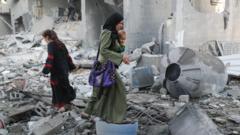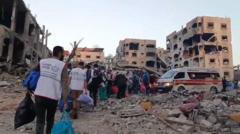In a complex negotiation backdrop, Hamas navigates its demands amid escalating pressure and violence in Gaza.
**Hamas Seeks Amendments to US Ceasefire Offer in Hostage Negotiations**

**Hamas Seeks Amendments to US Ceasefire Offer in Hostage Negotiations**
Hamas responds to a US ceasefire proposal, proposing hostage exchanges while demanding critical changes to the terms.
In a recent declaration, Hamas indicated its willingness to release 10 living Israeli hostages alongside 18 deceased ones in exchange for Palestinian prisoners, contingent on amendments to a US ceasefire plan. The militant group reiterated requests for a permanent truce, total Israeli withdrawal from Gaza, and a consistent flow of humanitarian aid—conditions not included in the current proposal.
Hamas's response was neither a firm rejection nor acceptance of the US terms, which Israel is reportedly inclined to agree to. Nevertheless, Israeli media sources suggested that Hamas's stance constitutes a de facto rejection of the offer. The group communicated its counterproposals to the US via Steve Witkoff, President Donald Trump’s special envoy to the Middle East, who described Hamas's reply as "totally unacceptable." He emphasized that without acceptance of the framework it proposed, the peace talks and a potential 60-day ceasefire could not commence.
The most recent US plan, the details of which remain largely undisclosed, is said to involve a temporary cessation of hostilities, a tiered release of hostages, and humanitarian aid influx through established channels. Pressure mounts on Hamas, as failure to engage positively could lead to intensified Israeli military offense, an outcome Hamas is ill-equipped to counter.
Prime Minister Benjamin Netanyahu's government faces its own set of pressures, as he is committed to bringing hostages home yet insists on terms that prevent Hamas's resurgence. Israeli officials have voiced unwavering determination to eliminate Hamas's military capabilities, emphasizing a clear line between hostages and Hamas's demands.
As the situation unfolds, conditions have continued to deteriorate in Gaza with a recent toll of 60 deaths reported on a single day, exacerbating concerns over humanitarian crises amidst ongoing conflict. As negotiations remain uncertain, the reality for Gazans worsens against the backdrop of escalating violence since the outbreak of the conflict.
This incredibly intricate standoff highlights the difficulties faced by both parties, as they wrestle with the high stakes of war, humanitarian needs, and the search for a long-term resolution.
Hamas's response was neither a firm rejection nor acceptance of the US terms, which Israel is reportedly inclined to agree to. Nevertheless, Israeli media sources suggested that Hamas's stance constitutes a de facto rejection of the offer. The group communicated its counterproposals to the US via Steve Witkoff, President Donald Trump’s special envoy to the Middle East, who described Hamas's reply as "totally unacceptable." He emphasized that without acceptance of the framework it proposed, the peace talks and a potential 60-day ceasefire could not commence.
The most recent US plan, the details of which remain largely undisclosed, is said to involve a temporary cessation of hostilities, a tiered release of hostages, and humanitarian aid influx through established channels. Pressure mounts on Hamas, as failure to engage positively could lead to intensified Israeli military offense, an outcome Hamas is ill-equipped to counter.
Prime Minister Benjamin Netanyahu's government faces its own set of pressures, as he is committed to bringing hostages home yet insists on terms that prevent Hamas's resurgence. Israeli officials have voiced unwavering determination to eliminate Hamas's military capabilities, emphasizing a clear line between hostages and Hamas's demands.
As the situation unfolds, conditions have continued to deteriorate in Gaza with a recent toll of 60 deaths reported on a single day, exacerbating concerns over humanitarian crises amidst ongoing conflict. As negotiations remain uncertain, the reality for Gazans worsens against the backdrop of escalating violence since the outbreak of the conflict.
This incredibly intricate standoff highlights the difficulties faced by both parties, as they wrestle with the high stakes of war, humanitarian needs, and the search for a long-term resolution.



















